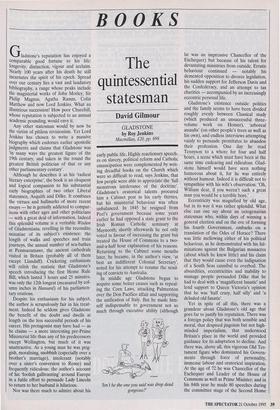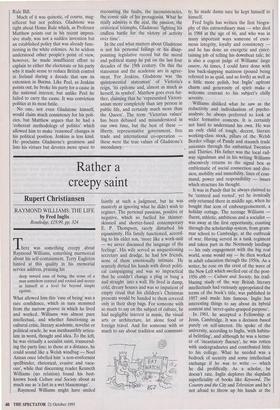BOOKS
The quintessential statesman
David Gilmour
GLADSTONE
by Roy Jenkins Macmillan, £20, pp. 698 Gladstone's reputation has enjoyed a comparable good fortune to his life: longevity, distinction, vigour and acclaim. Nearly 100 years after his death he still incarnates the spirit of his epoch. Spread over our century lies a vast and laudatory bibliography, a range whose peaks include the magisterial works of John Morley, Sir Philip Magnus, Agatha Ramm, Colin Matthew and now Lord Jenkins. What an illustrious succession! How poor Churchill, whose reputation is subjected to an annual academic pounding, would envy it.
Any other statesman would by now be the victim of pitiless revisionism. Yet Lord Jenkins has chosen to write a massive biography which endorses earlier apostolic judgments and claims that Gladstone was `in many ways the greatest figure of the 19th century, and taken in the round the greatest British politician of that or any other parliamentary century'.
Although he describes it as his 'rashest literary enterprise', the book is an eloquent and logical companion to his substantial early biographies of two other Liberal statesmen, Asquith and Dilke. It combines the virtues and hallmarks of more recent essays — he is genially addicted to compar- isons with other ages and other politicians — with a great deal of information. Indeed this splendid volume is a veritable Wisden of Gladstoniana, revelling in the recondite minutiae of its subject's existence: the length of walks and speeches and train journeys, the annual number of sea-bathes at Penmaenmawr, the ancient cathedrals visited in Britain (probably all of them except Llandaff). Cricketing enthusiasts will relish the statistic that Gladstone's speech introducing the first Home Rule Bill, which lasted 3 hours and 25 minutes, was only the 12th longest (measured by col- umn inches in Hansard) of his parliamen- tary orations.
Despite his enthusiasm for his subject, the author is scrupulously fair in his treat- ment. Indeed he seldom gives Gladstone the benefit of the doubt and dwells at length on the less successful periods of his career. His protagonist may have had — as he claims — a more interesting pre-Prime Ministerial life than any of his predecessors except Wellington, but much of it was unattractive. As a young man he was prig- gish, moralising, snobbish (especially over a brother's marriage), intolerant (notably over a sister's conversion to Rome) and frequently ridiculous: the author's account of his 'foolish gallivanting' around Europe in a futile effort to persuade Lady Lincoln to return to her husband is hilarious.
Nor was there much to admire about his early public life. Highly reactionary speech- es on slavery, political reform and Catholic emancipation were complemented by writ- ing dreadful books on the Church which were so difficult to read, says Jenkins, that few people were able to appreciate the 'full monstrous intolerance of the doctrine'. Gladstone's oratorical talents procured him a Cabinet post in his early thirties, but his ministerial behaviour was often unbalanced. In 1845 he resigned from Peel's government because some years earlier he had opposed a state grant to the Irish Roman Catholic seminary at Maynooth; shortly afterwards he not only voted in favour of increasing the grant but treated the House of Commons to a two- and-a-half hour explanation of his reasons. Returning to the Cabinet some months later, he became, in the author's view, 'at best an indifferent Colonial Secretary', noted for his attempt to resume the send- ing of convicts to Australia.
In middle age Gladstone began to acquire some better causes such as repeal- ing the Corn Laws, attacking Palmerston over the Don Pacifico affair and supporting the unification of Italy. But he made him- self indispensable to government not so much through executive ability (although 'Isn't he the one you said was drop dead gorgeous?' he was an impressive Chancellor of the Exchequer) but because of his talent for devastating ministries from outside. Erratic behaviour continued — notably his demented opposition to divorce legislation, his sudden support for Jefferson Davis and the Confederacy, and an attempt to tax charities — accompanied by an increasingly eccentric personal life.
Gladstone's existence outside politics and the family seems to have been divided roughly evenly between Classical study (which produced an unsuccessful three- volume work on Homer), 'arboreal assaults' (on other people's trees as well as his own), and endless interviews attempting vainly to persuade prostitutes to abandon their profession. One day he read Tennyson to a whore for four and half hours, a scene which must have been at the same time endearing and ridiculous. Glad- stone himself would have seen nothing humorous about it, for he was entirely without humour. Indeed it is difficult not to sympathise with his wife's observation: 'Oh, William dear, if you weren't such a great man you would be a terrible bore.'
Eccentricity was magnified by old age, but in its way it was rather splendid. What else can one say about an octogenarian statesman who, within days of winning a general election and on the eve of forming his fourth Government, embarks on a translation of the Odes of Horace? There was little mellowing either of his political behaviour, as he demonstrated with his ful- minations against the Bulgarian massacres (about which he knew little) and his claim that they would cause even the indignation of a South Seas cannibal to overboil. The absurdities, eccentricities and inability to manage people persuaded Dilke that he had to deal with a 'magnificent lunatic' and lend support to Queen Victoria's opinion that he was 'half crazy, half silly' and 'a deluded old fanatic'.
Yet in spite of all this, there was a grandeur about Gladstone's old age that goes far to justify his reputation. There was a foreign policy that was both sensible and moral, that despised jingoism but not high- minded imperialism, that understood Britain's place in the world and provided guidance for its adaptation to decline. And there was, above all, this vigorous Old Tes- tament figure who dominated his Govern- ments through force of personality, immense labour and oratorical inspiration. At the age of 72 he was Chancellor of the Exchequer and Leader of the House of Commons as well as Prime Minister; and in his 84th year he made 80 speeches during the committee stage of the Second Home Rule Bill.
Much of it was quixotic, of course, mag- nificent but not politics. Gladstone was right about Home Rule which, as Professor Matthew points out in his recent impres- sive study, was not a sudden invention but an established policy that was already func- tioning in the white colonies. As he seldom understood other people's point of view, however, he made insufficient effort to explain to either the electorate or his party why it made sense to reduce British control in Ireland during a decade that saw its extension in Burma. Like Peel, as Jenkins points out, he broke his party for a cause in the national interest; but unlike Peel he failed to carry the cause. It was conviction politics at its most futile.
No one, not even Gladstone himself, would claim much consistency for his poli- cies, but Matthew argues that he had a `coherent methodology of politics' which allowed him to make 'reasoned' changes in his political position. Jenkins is less kind. He proclaims Gladstone's greatness and lists his virtues but devotes more space to recounting the faults, the inconsistencies, the comic side of his protagonist. What he really admires is the zeal, the passion, the oratorical triumphs, Gladstone 'fighting his endless battle for the victory of activity over time'.
In the end what matters about Gladstone is not his personal failings or his disap- pointing legislative record but the moral and political stamp he put on the last four decades of the 19th century. On this the statesman and the academic are in agree- ment. For Jenkins, Gladstone was 'the quintessential statesman' of Victoria's reign, 'its epitome and, almost as much as herself, its symbol'. Matthew goes even fur- ther, claiming that he 'represented Victori- anism more completely than any person in public life, and certainly much more than the Queen'. The term 'Victorian values' has been debased and misunderstood in our own time, but the best of these liberty, representative government, free trade and international co-operation these were the true values of Gladstone's ascendancy,











































































 Previous page
Previous page